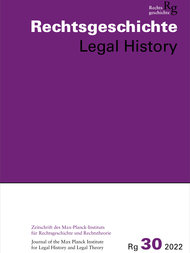Open Access
The motivation of the international Open Access movement is to make the results of scientific research freely available online. Over the last two decades, this idea has become an integral part of the discourse on scientific publishing and has given rise to new publishing models. The mpilhlt, too, has adapted its publishing strategy to this transformation and increasingly offers its publications in Open Access.
The Institute’s journal Rechtsgeschichte – Legal History, which started out in 2002 as a print journal only, is now published simultaneously in Open Access and as a printed edition; older printed issues are progressively being made available online. The Research Paper Series launched in 2012 and the book series Global Perspectives on Legal History, the first volume of which was published in 2014, were conceptualised as Open Access publications from the outset. The same holds for the Institute's most recent book series, Max Planck Studies in Global Legal History of the Iberian Worlds (since 2020). For the longer established publication series (Studien zur europäischen Rechtsgeschichte, Studien zu Policey, Kriminalitätsgeschichte und Konfliktregulierung), we plan to make future volumes freely available via the Max Planck Society’s online repository and the mpilhlt's homepage three years after publication in print. Older volumes of these series, as well as those of series that have been discontinued (Rechtsprechung. Materialien und Studien), are also to be made successively available. The publications of the School of Salamanca and the journal Administory are already published entirely in Open Access. Open Access content of the American Journal of Legal History is available via the journal’s website.
Rechtsgeschichte – Legal History (Rg) is the journal of the Max Planck Institute for Legal History and Legal Theory. It is edited by the Institute’s directors, Marietta Auer, Thomas Duve and Stefan Vogenauer. The journal aims to be a forum for high-level scholarship in all branches of legal history. Its scope therefore reflects the full breadth of the discipline and is not restricted to particular periods of time or specific areas of law. Its particular profile derives from the research conducted at the Institute on the legal history of Europe, the common law world and the Iberian empires.
more
The book series
Global Perspectives on Legal History, edited by Marietta Auer, Thomas Duve and Stefan Vogenauer, opens up the legal history of Europe to the history of its global connections. It publishes monographs as well as edited volumes which transcend the established boundaries of national legal scholarship and focus on different modes of normativity and law as well as on their historical development.
more
The institute’s own
Research Paper Series is edited by the directors, Marietta Auer, Thomas Duve and Stefan Vogenauer. Since 2012, this multilingual series is available online in the Social Science Research Network (SSRN) eLibrary. Working papers, pre-prints and post-prints that provide new insights, perspectives and suggestions for legal-historical research are published in Open Access.
more
»The School of Salamanca. A Digital Collection of Sources and a Dictionary of its Juridical-Political Language« is a joint project of the mpilhlt, the Goethe University Frankfurt and the Academy of Sciences and Literature, Mainz. The publication project aims to build a digital text corpus of selected 16
th- and 17
th-century printed editions of more than 100 works of the Salmantine jurists and theologians, publication project aims to build a digital text corpus of selected 16
th- and 17
th-century printed editions of more than 100 works of the Salmantine jurists and theologians, available online in Open Access.
more
The volumes published in this book series deal with legal-historical research on areas that interacted with the Iberian empires during the early modern and modern periods in Europe, the Americas, Asia and Africa. The focus of this series is global in the sense that it does not just limit itself to imperial spaces as such, but also looks at the globalisation of norms within the spaces that were in contact with these imperial formations. The global dimension is, moreover, underscored by the attention paid to the coexistence of a variety of normativities and their cultural translations at different times and in different places. The volumes thus decentre traditional research perspectives and are open to exploring various modes of normativity.
more




